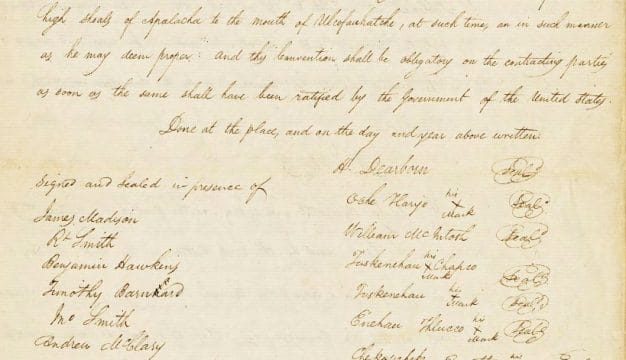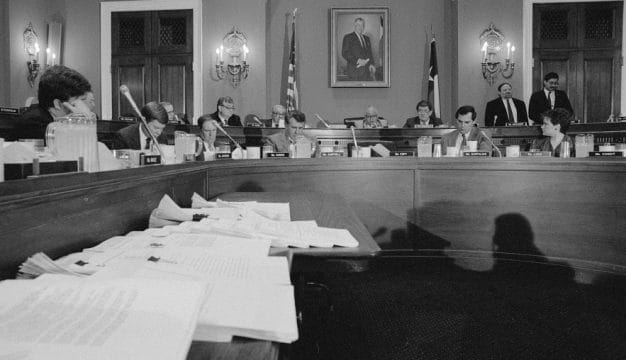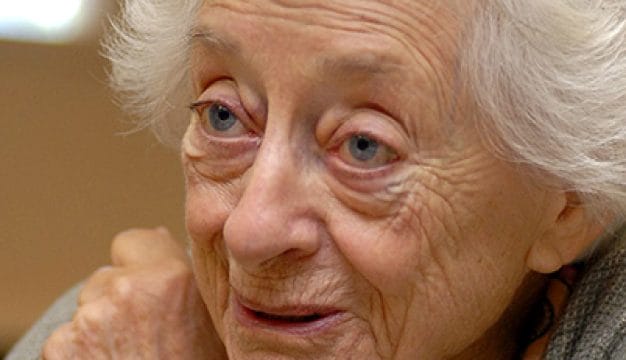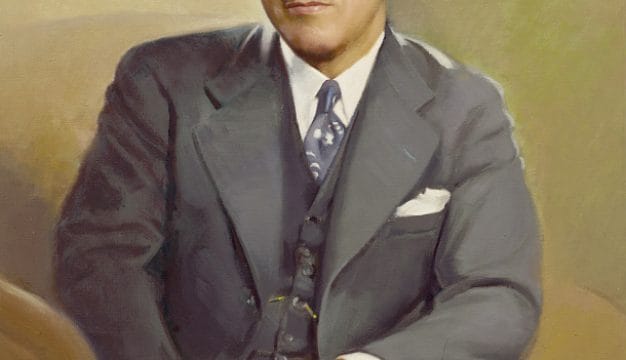Lionel Richie
Musician and composer Lionel Richie (1949- ) is an internationally known and respected performer. His long and successful career began at Tuskegee University with the chart-topping rhythm and blues (R&B) and soul and funk group The Commodores and continued with his solo career, which he embarked upon in 1980.
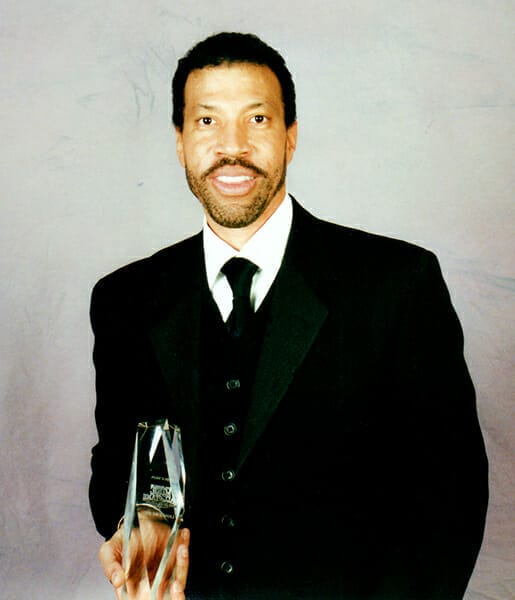 Lionel Richie
Lionel Brockman Richie, was born on June 20, 1949, in Tuskegee, Macon County, to Lyonel Brockman Richie Sr., a retired Army captain, and Alberta Foster Richie, an elementary school teacher and graduate of Tuskegee University. His family lived just across the street from the campus of the university, where his grandmother served as choir director, and he spent much of his childhood on the campus. Richie was raised in a strict, religious middle-class family. Young Lionel, thus, had early ambitions of entering the ministry. He also had a fondness and talent for music, however, with his musical roots coming not only from his grandmother, but also from an uncle who was a big band player and former musical arranger for Edward Kennedy “Duke” Ellington and who gave Lionel his first saxophone. Lionel’s grandmother encouraged his musical interests as well, ensuring that he practiced piano daily and attended all of Tuskegee’s musical events. These experiences, along with his increasing interest in jazz, pop, and country music, all played a role in shaping his future career.
Lionel Richie
Lionel Brockman Richie, was born on June 20, 1949, in Tuskegee, Macon County, to Lyonel Brockman Richie Sr., a retired Army captain, and Alberta Foster Richie, an elementary school teacher and graduate of Tuskegee University. His family lived just across the street from the campus of the university, where his grandmother served as choir director, and he spent much of his childhood on the campus. Richie was raised in a strict, religious middle-class family. Young Lionel, thus, had early ambitions of entering the ministry. He also had a fondness and talent for music, however, with his musical roots coming not only from his grandmother, but also from an uncle who was a big band player and former musical arranger for Edward Kennedy “Duke” Ellington and who gave Lionel his first saxophone. Lionel’s grandmother encouraged his musical interests as well, ensuring that he practiced piano daily and attended all of Tuskegee’s musical events. These experiences, along with his increasing interest in jazz, pop, and country music, all played a role in shaping his future career.
During a brief move from Alabama to Illinois with his family, Richie graduated from Joliet Central High School East in Joliet, Illinois. Upon completing high school in 1967, Richie enrolled in Tuskegee University on a tennis scholarship and graduated in 1974 with a Bachelor of Science degree in economics. While there, he joined a musical trio with fellow students Thomas McClary and William King called The Mystics. The group played local proms and dances in Tuskegee, then merged with another local group called The Jays in 1968. Using a dictionary to choose a new name, the members came up with The Commodores, based on the old naval term for the rank between captain and admiral.
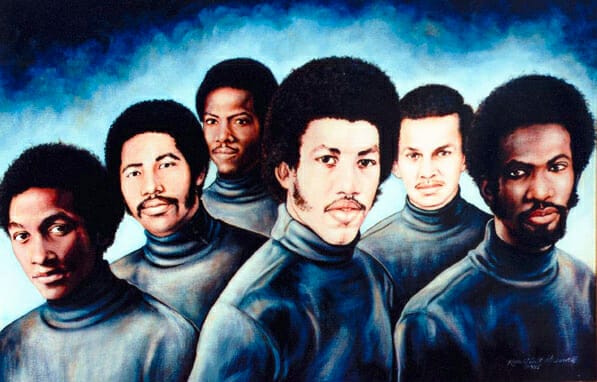 Commodores
The original Commodores consisted of Richie, who played saxophone, Thomas McClary (lead guitar), William King (trumpet, synthesizer, and rhythm guitar), Andre Callaghan (drums), and a bass player known as “Railroad,” who was their earliest lead singer. Callaghan left the band in 1969 to join the U.S. Navy and was replaced by Ronald La Pread. The most successful lineup with Richie included McClary, King, La Pread (bass and trumpet), Milan Williams (keyboards, trombone, and rhythm guitar), and Walter Orange (drums and vocals). The ensemble aimed to reach large audiences and surmount the limits placed on many African American musical groups in the South, most of which were limited to performing for black audiences in small venues on what was known as the “chitlin circuit.” The group also strove to become a tight-knit and charismatic ensemble, researching the successes and failures of other performers, black and white, around the Tuskegee area. The Commodores spent weekends and holidays performing around Alabama and in neighboring Mississippi and Louisiana.
Commodores
The original Commodores consisted of Richie, who played saxophone, Thomas McClary (lead guitar), William King (trumpet, synthesizer, and rhythm guitar), Andre Callaghan (drums), and a bass player known as “Railroad,” who was their earliest lead singer. Callaghan left the band in 1969 to join the U.S. Navy and was replaced by Ronald La Pread. The most successful lineup with Richie included McClary, King, La Pread (bass and trumpet), Milan Williams (keyboards, trombone, and rhythm guitar), and Walter Orange (drums and vocals). The ensemble aimed to reach large audiences and surmount the limits placed on many African American musical groups in the South, most of which were limited to performing for black audiences in small venues on what was known as the “chitlin circuit.” The group also strove to become a tight-knit and charismatic ensemble, researching the successes and failures of other performers, black and white, around the Tuskegee area. The Commodores spent weekends and holidays performing around Alabama and in neighboring Mississippi and Louisiana.
The Commodores’ first studio recording took place in New York in February 1969. It was arranged by R&B producer Jerry Williams, who had heard them perform in Tuskegee the year before. The recording session produced only one single, however—”Keep on Dancin’,”—that did not garner much interest. The group later met Benny Ashburn, a marketing executive in New York, who became their manager and together with them formed the Commodores Entertainment Corporation. In 1970, Ashburn arranged for the Commodores to play at a black lawyers’ convention in New York, where they were noticed by Suzanne De Passe of Motown Records. De Passe, who was working with the Jackson Five at the time, signed the group to open for the Jackson Five for a number of concert dates, beginning a long association with Motown Records and exposing the group to larger audiences. In 1971, they toured again with the Jackson Five, playing in stadiums across the United States. The group was then signed by MoWest Records, a subsidiary of Motown, to capitalize on the growing popularity of funk. The group’s first hit was “Machine Gun,” an instrumental written by Milan Williams and released on their debut album Machine Gun in 1974. In 1975, Richie married his college sweetheart, Brenda Harvey. The couple would adopt daughter Nicole in 1983.
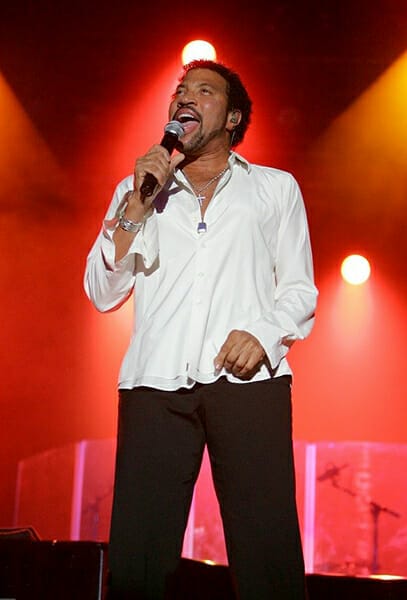 l
The Commodores achieved considerable commercial success with love ballads written and sung by Richie. These songs included the number one R&B singles “Slippery When Wet” (1975), “Just to Be Close to You” (1976), and “Easy” (1977), and the number one U.S. Billboard magazine Hot 100 and R&B hits “Three Times a Lady” (1978) and “Still” (1979). In 1980, he wrote and produced “Lady” for country singer Kenny Rogers; the song was a Billboard magazine number one for six weeks and remains one of Rogers’ most popular hits. The following year, Richie wrote and recorded (with Diana Ross) the title song for the film Endless Love. One of Motown Records’ best-selling singles, it earned Richie an Academy Award nomination, five Grammy nominations, an American Music Award, and a People’s Choice Award.
l
The Commodores achieved considerable commercial success with love ballads written and sung by Richie. These songs included the number one R&B singles “Slippery When Wet” (1975), “Just to Be Close to You” (1976), and “Easy” (1977), and the number one U.S. Billboard magazine Hot 100 and R&B hits “Three Times a Lady” (1978) and “Still” (1979). In 1980, he wrote and produced “Lady” for country singer Kenny Rogers; the song was a Billboard magazine number one for six weeks and remains one of Rogers’ most popular hits. The following year, Richie wrote and recorded (with Diana Ross) the title song for the film Endless Love. One of Motown Records’ best-selling singles, it earned Richie an Academy Award nomination, five Grammy nominations, an American Music Award, and a People’s Choice Award.
In 1982, Richie ended his association with the Commodores in order to focus on his burgeoning career as a solo artist, songwriter, and producer working with a variety of record companies. That year, Richie released his first solo album, Lionel Richie, which sold more than two million copies. His first single from that album, “Truly,” topped the Billboard chart for two weeks and reached the Top Ten in several other charts. His second album, Can’t Slow Down (1983), featured the chart-topping singles “Hello,” “Penny Lover,” and “All Night Long,” which marked a significant departure from his typical love ballad style for its use of Caribbean rhythms. It sold more than two million copies and won a Grammy Award for Record of the Year. Responding to famine in Ethiopia in 1986, Richie and pop star Michael Jackson wrote “We Are the World,” which was recorded and produced by Quincy Jones. The record featured numerous famous musicians known collectively as United Support of Artists for Africa and raised millions of dollars for famine relief and earned five Grammy awards.
Also in 1986, Richie won an Oscar for his song, “Say You, Say Me,” for the film White Nights, starring Gregory Hines and Mikhail Baryshnikov; he was also nominated that year for the song “Miss Celie’s Blues” from the film The Color Purple. Richie continued to tour and perform with great success in the 1980s but released only one other studio album in that decade, Dancing on the Ceiling, in 1986. In 1990, Richie returned to Alabama to care for his ailing father, who passed away that year. In 1993, Ritchie divorced Harvey and two years later married Diane Alexander, with whom he had two children, Miles Brockman and Sofia. The couple would divorce in 2004.
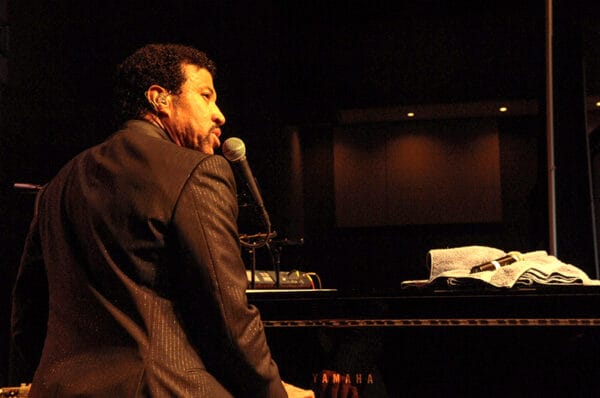 l
Richie continued to record and tour throughout the 1990s and 2000s, but he did not maintain his past broad commercial success in the United States. He did, however, find new audiences and success overseas, including six Top 40 singles in the United Kingdom since 2004. He has also achieved great popularity in recent years in the Arabic-speaking world, performing in Morocco, Qatar, Dubai, and Libya. Richie regularly tours and performs, including appearances on American Idol, and at the Grammy Awards. In 2009, he released the album Just Go, and in 2012, he released Tuskegee, a collection of hits recorded as duets with various country music stars that went platinum. In early 2010, Richie teamed up again with producer Quincy Jones to record a new version of “We Are the World” for relief efforts following the devastating January 2010 Haiti earthquake. His philanthropic work also includes support for breast cancer awareness in honor of his grandmother, who survived the disease and lived to the age of 104. In 2017, Richie was honored at the Kennedy Center Honors and in 2022 was awarded the Library of Congress Gershwin Prize for Popular Song. Richie lives in Los Angeles, California, and has a home in Tuskegee.
l
Richie continued to record and tour throughout the 1990s and 2000s, but he did not maintain his past broad commercial success in the United States. He did, however, find new audiences and success overseas, including six Top 40 singles in the United Kingdom since 2004. He has also achieved great popularity in recent years in the Arabic-speaking world, performing in Morocco, Qatar, Dubai, and Libya. Richie regularly tours and performs, including appearances on American Idol, and at the Grammy Awards. In 2009, he released the album Just Go, and in 2012, he released Tuskegee, a collection of hits recorded as duets with various country music stars that went platinum. In early 2010, Richie teamed up again with producer Quincy Jones to record a new version of “We Are the World” for relief efforts following the devastating January 2010 Haiti earthquake. His philanthropic work also includes support for breast cancer awareness in honor of his grandmother, who survived the disease and lived to the age of 104. In 2017, Richie was honored at the Kennedy Center Honors and in 2022 was awarded the Library of Congress Gershwin Prize for Popular Song. Richie lives in Los Angeles, California, and has a home in Tuskegee.
In 2015, former band bodyguard established the Commodores Museum in Tuskegee; it is housed in the band’s former rehearsal and recording space and features memorabilia that includes costumes, equipment, instruments, and other artifacts.
Additional Resources
Hildebrand, Lee. Stars of Soul and Rhythm & Blues: Top Recording Artists and Showstopping Performers, from Memphis and Motown to Now. New York: Watson-Guptill, 1994.
Nathan, David. Lionel Richie: An Illustrated Biography. New York: McGraw-Hill, 1984.
